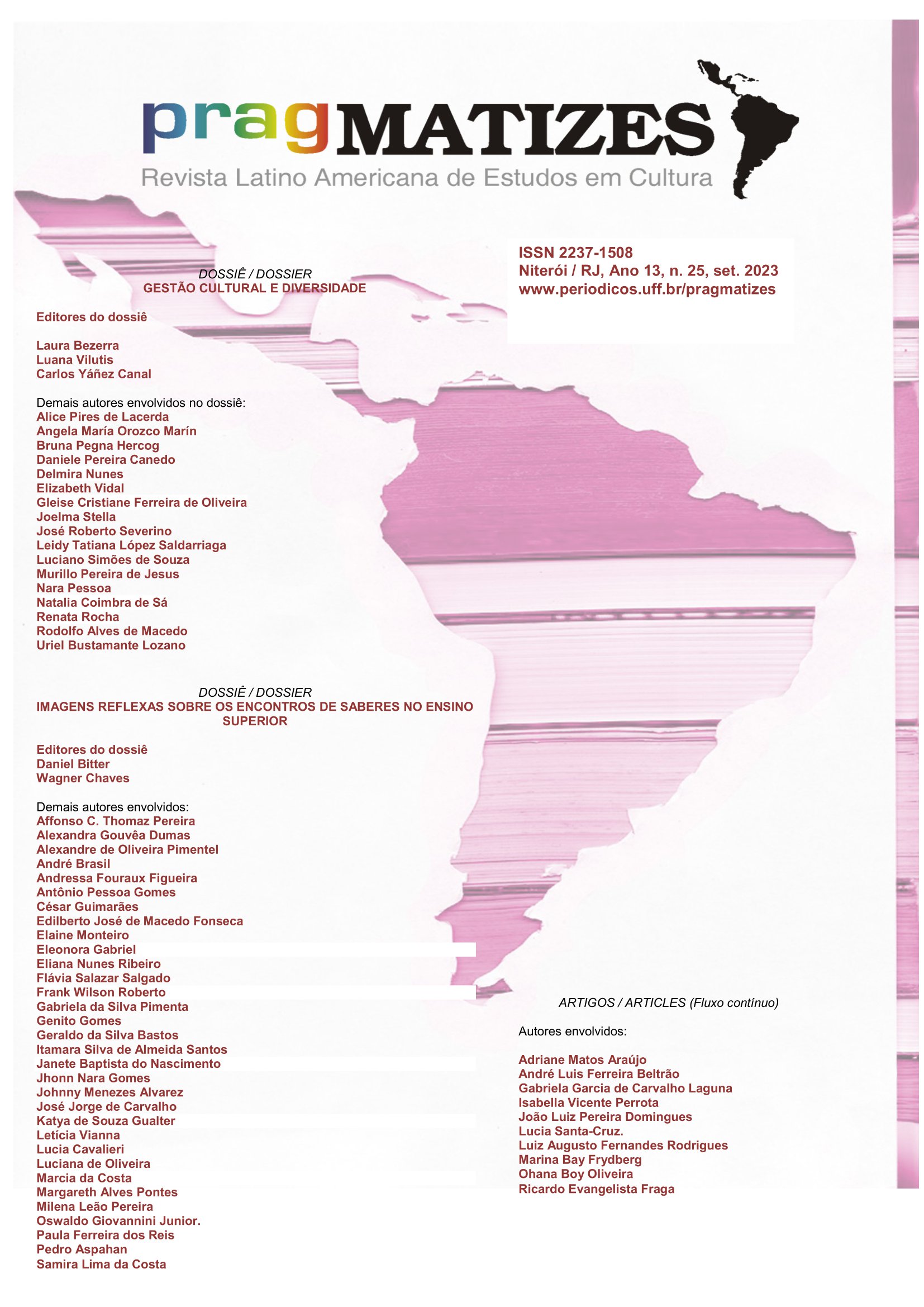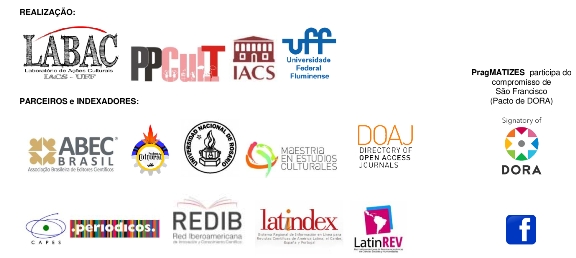Educing with honey and dendê
: knowledge of the terreiros, children and anti-racist education
DOI:
https://doi.org/10.22409/pragmatizes.v13i25.58002Keywords:
: education in candomblé terreiros, childhoods, religious racism, ; racism at school.Abstract
This article is the result of research work for the completion of the Degree in Pedagogy. It aimed at the investigation of the terreiro as a space for education and as a place that produces a narrative of the history of the black people in Brazil, identifying how resistance to slavery and domination in Candomblé occurred in the African diaspora, as well as processes of transmission of knowledge and affirmation of black identity. It is based and justified on the study of structural racism, in its relationship with the school and the curriculum and its implications and consequences on the subjectivity of black people, especially children. It presents the Candomblé terreiro as a space for education, culture, strengthening and affirmation of the identity of black people. The theoretical-methodological references of the research are based on the concepts of crossroads, whirlpool, researcher-cambono, as well as orality and oral reading specially to deal with the interview carried out with Mãe Rosiane Rodrigues de Yemanjá. From the interview and the dialogue established in it, issues such as ancestry, education in the terreiros, childhood, racism, problems faced by candomblé children at school and the relationship between candomblé and life emerge.
Keywords: education in candomblé terreiros; childhoods; religious racism; racism at school.
Downloads
References
, S. Racismo estrutural. São Paulo: Pólen, 2019.
BÂ, Amadou Hampaté. A tradição viva. In: ISKANDER, Z. (org.). História Geral da África. Vol 1. São Paulo: Ática, Unesco, 1980.
BERTH, Joice. Empoderamento. São Paulo: Sueli Carneiro; Jandaíra 2020.
CARNEIRO, Sueli. Racismo, sexismo e desigualdade no Brasil. São Paulo: Selo Negro, 2011.
CARVALHO, José Jorge de. Encontro de Saberes e descolonização: para uma refundação étnica, racial e epistêmica das universidades brasileiras. In: BERNARDINO-COSTA, Joaze; MALDONADO-TORRES, Nelson; GROSFOGUEL, Ramón (orgs.). Decolonialidade e pensamento afrodiaspórico. Belo Horizonte: Autêntica, 2019.
EVARISTO, Conceição. A Escrevivência e seus subtextos. In: DUARTE, Constância Lima; NUNES, Isabella Rosado (orgs.). Escrevivência: a escrita de nós – reflexões sobre a obra de Conceição Evaristo. Rio de Janeiro: Mina Comunicação e Arte. 2020.
EVARISTO, Conceição. Escrevivência. Youtube, 2020. Disponível em: https://www.youtube.com/watch?v=QXopKuvxevY&t=1255s . Acesso em: 04 out. 2020.
FELISBERTO, Fernanda. Escrevivência como rota de escrita acadêmica. In: DUARTE, Constância Lima; NUNES, Isabella Rosado (orgs.). Escrevivência: a escrita de nós – reflexões sobre a obra de Conceição Evaristo. Rio de Janeiro: Mina Comunicação e Arte. 2020.
FERREIRA, Marta. Caderno/Diários de Asé: escritas de candomblé. Recôncavo: Revista de História da UNIABEU, v. 3, n. 5, 2013.
MARTINS, Leda Maria. Afrografias da memória: O Reinado do Rosário da Jatobá. [S. l.: s. n.], 2021.
MUNANGA, Kabengele. Negritude e identidade negra ou afrodescendente: um racismo ao avesso? Revista da ABPN, v. 4, n. 8, 2012. Disponível em: https://abpnrevista.org.br/site/article/view/246 . Acesso em: 30 abr. 2021.
RIBEIRO, Djamila. Pequeno Manual Antirracista. São Paulo: Companhia das Letras, 2019.
RUFINO, L.; SIMAS, Luiz Antônio. Fogo no mato: a ciência encantada das macumbas. Rio de Janeiro: Mórula, 2018
RUFINO, Luiz. Pedagogia das encruzilhadas. Rio de Janeiro: Mórula, 2019.
SANTOS, Gustavo A. O. O Existir na Pele Preta: contribuições de Fanon para a Psicologia Existencial. Phenomenology, Humanities and Sciences, v. 2, n. 2, p. 256-264, 2021. Disponível em: https://phenomenology.com.br/index.php/phe/article/view/127
SILVA, Cátia Candido; BORGES, Fabrícia Teixeira. O professor de tradição iorubá e a Pedagogia de Terreiro: uma proposição de educação antirracista. Revista Com Censo: Estudos Educacionais do Distrito Federal, [S.l.], v. 8, n. 1, p. 198-208 (36-46), abr. 2021. Disponível em: http://periodicos.se.df.gov.br/index.php/comcenso/article/view/1065 . Acesso em: 30 abr. 2021
SIMAS, Luiz Antônio. Soneto 32. Rio de Janeiro. 21 de julho de 2021. Instagram: @luizantoniosimas. Disponível em: https://www.instagram.com/p/CQZ-mY2pe1s/?igshid=MmJiY2I4NDBkZg%3D%3D . Acesso em: 25 maio 2023.
SODRÉ, Muniz. O terreiro e a cidade: A forma social negra-brasileira. Rio de Janeiro: Mauad, 2019.
Published
How to Cite
Issue
Section
License

This work is licensed under a Creative Commons Attribution 4.0 International License.
By forwarding an original to PragMATIZES, the authors agree that the copyright related to it is transferred to the Publishing. Articles and other writings are made available in PDF format from their publication, and they can be downloaded to institutional repositories and personal pages, provided that with their proper bibliographic indication.



